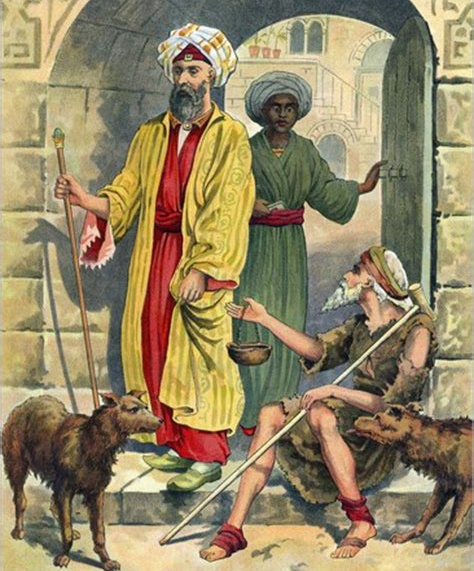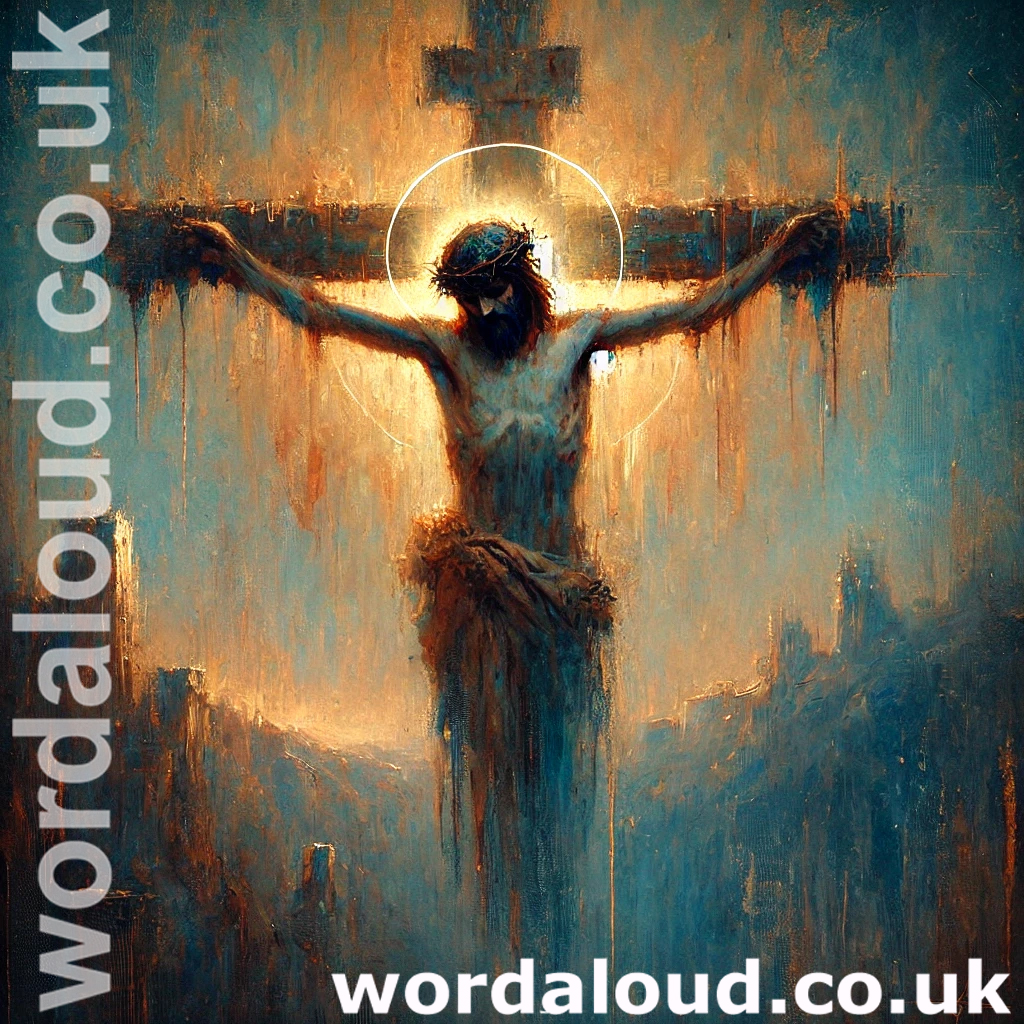Luke 16: 19-31
19 ¶ There was a certain rich man, which was clothed in purple and fine linen, and fared sumptuously every day:
20 And there was a certain beggar named Lazarus, which was laid at his gate, full of sores,
21 And desiring to be fed with the crumbs which fell from the rich man’s table: moreover the dogs came and licked his sores.
22 And it came to pass, that the beggar died, and was carried by the angels into Abraham’s bosom: the rich man also died, and was buried;
23 And in hell he lift up his eyes, being in torments, and seeth Abraham afar off, and Lazarus in his bosom.
24 And he cried and said, Father Abraham, have mercy on me, and send Lazarus, that he may dip the tip of his finger in water, and cool my tongue; for I am tormented in this flame.
25 But Abraham said, Son, remember that thou in thy lifetime receivedst thy good things, and likewise Lazarus evil things: but now he is comforted, and thou art tormented.
26 And beside all this, between us and you there is a great gulf fixed: so that they which would pass from hence to you cannot; neither can they pass to us, that would come from thence.
27 Then he said, I pray thee therefore, father, that thou wouldest send him to my father’s house:
28 For I have five brethren; that he may testify unto them, lest they also come into this place of torment.
29 Abraham saith unto him, They have Moses and the prophets; let them hear them.
30 And he said, Nay, father Abraham: but if one went unto them from the dead, they will repent.
31 And he said unto him, If they hear not Moses and the prophets, neither will they be persuaded, though one rose from the dead.
Jesus speaks in parables when he has something important to communicate. The meaning of a parable may seem obscure or in need of explanation. Jesus does give interpretations of the parables to his disciples. We are encouraged through the parables to see our world in new and perhaps unexpected ways. The parables encourage us to think more deeply about Jesus’ teaching. They are, above all, a challenge – even an anarchic challenge – to everything we think we know.
In the parable of Lazarus and the rich man, there are three persons: the poor Lazarus, the rich man without a name, and Father Abraham. In the parable, Abraham represents the will of God. The rich man represents those who have power in the world, in terms of worldly ideologies centred on worldly riches. Lazarus represents the cry of the poor, the needy, the excluded, whose voice may not be heard in our world and whose needs and basic human dignity may not be recognised.
We are assured in the parable of the immortality of the soul and of reward or retribution in the next life. We are also assured of judgement immediately after death, after which no further penitence is possible. It is while Lazarus is begging at his gate that for the rich man there is a possibility of redemption. Lazarus, in the parable, is the rich man’s only possibility of redemption. Once Lazarus has died, the rich man cannot help himself. As Jesus will say: ‘For I was an hungred, and ye gave me no meat: I was thirsty, and ye gave me no drink.’ So he dies, his opportunity gone from him.
Earthly possessions, and earthly suffering, are transient things. It is only when the rich man has died that he sees the truth. Then he sees what is truly of value. Lazarus is in the bosom of Abraham. He is at home. He is blessed. The rich man cries for mercy, and for what must have once been so little but has now become so much: a drop of water. He cries for Lazarus, the person he now sees is his only possible benefactor. But now this is impossible. ‘A great gulf is fixed.’ There can be no more passage from sin through penitence.
While he has never been concerned for the poor, the rich man is concerned for his brothers. He begs that they be warned, and by Lazarus. Yet he is told, they have the Old Law, they have Moses and the prophets. Let them discover justice, mercy and love in the Old Testament. Moreover, so Abraham says, if they will not listen to Moses and the prophets, then they won’t be convinced even if someone rises from the dead to show them what’s right!
The parable, then, warns us to listen to Jesus, to see the poor and the needy when they sit at our gates, to help them. We are called to see Jesus in all our fellow human beings, especially those who are most in need of what we can give. We are taught to see beyond the social scheme of things, to turn such sets of value upside down. We are taught to fear God and follow the Scriptures.
‘All our fear of God is inspired by love; perfect love of God makes fear perfect. We show our love of God especially when we follow his advice, conform to his laws and trust in his promises.’ St Hilary
Audio Bible KJV | Endnotes
The Parable of Lazarus and the Rich Man is told by Jesus teaching life and faith. Jesus presents a vivid contrast between two characters: Lazarus, a poor and destitute man who is righteous and deserving of heaven, and the Rich Man, a wealthy man who is depicted as selfish and unjust, who is given his chances, rejects them, and goes to hell.
The story of Lazarus and the Rich Man is a warning about the dangers of wealth and the importance of compassion and charity. In the parable, Jesus highlights the differences between the two men: Lazarus is poor and at the Rich Man’s gate, while the Rich Man lives a life of luxury and comfort. No matter such extreme social inequality, both men ultimately face death and are judged by God. In the end, Lazarus is comforted in heaven while the Rich Man is punished in hell.
Heaven And Hell
The message of the parable is clear: wealth and material prosperity can often be a hindrance to spiritual growth and can lead to spiritual poverty and to hell. Jesus emphasizes the importance of caring for the poor and the marginalized, as figured in the person of Lazarus in the story. The Rich Man, on the other hand, is punished for his lack of compassion and his inability to see the needs of others – in his rejection of fellowship and in his luxury of riches he damns himself.
The Parable of Lazarus and the Rich Man is a powerful illustration of the consequences of actions and beliefs. All of our choices and behaviours have eternal consequences. It is never too late to change our ways and seek redemption.
Life Of Jesus | Prayer And Teaching
The Parable of Lazarus and the Rich Man relates to the Sermon on the Mount and Jesus’ prayer in the Garden of Gethsemane. Jesus teaches the importance of compassion and charity, towards one another in matters of sin and forgiveness of sin, and especially towards the poor and marginalized. Jesus teaches: ‘Blessed are the merciful: for they shall obtain mercy.’ (Matthew 5:7 KJV)
Similarly, Jesus’ prayer in the Garden of Gethsemane, where he agonizes over his sacrifice on the Cross, is connected to the message of the Parable of Lazarus and the Rich Man. The Passion and Crucifixion of Jesus are testament to Jesus’ ultimate sacrifice for humanity.
Additionally, the Parable of the Prodigal Son, told by Jesus, reinforces the message of the Parable of Lazarus and the Rich Man by emphasizing themes of repentance, forgiveness, and redemption. The prodigal son’s return to his father and the father’s unconditional love for his son are powerful illustrations of the love and forgiveness available to all who ask.








